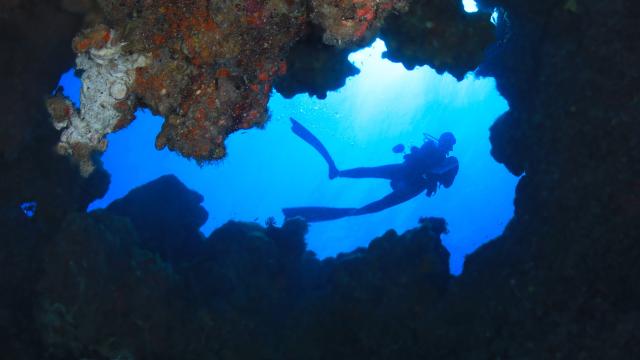It’s no secret that corals are dying at an alarming rate. While climate change heating up the oceans is understood to be screwing over corals, a new study points fingers at a different culprit: pollution.
Published in the journal Marine Biology Tuesday, the study used 30 years’ worth of data to conclude that nutrient pollution stemming from fertiliser and improperly treated sewage is behind coral death in the Looe Key Reef in the Florida Keys. In fact, the study authors appear to suggest that pollution has been a greater detriment to corals in the area than rising ocean temperatures. Climate change is simply making the situation worse.
The research includes data from 179 sampling events between 1984 to 2014. The authors looked at seawater data throughout these years where they were able to measure the amount of nitrogen, phosphorus, and other nutrients in addition to seaweed, which can indicate how nutrients are affecting the ecosystem.
The researchers also looked at ocean temperature data to compare its role versus that of this pollution. Satellite imagery helped the scientists figure out how connected the different bodies of water near the reefs are to confirm where the pollution was coming from. The team, finally, used underwater photographs of the corals to determine how all this was impacting them.
By 2008, only 6 per cent of Looe Key Sanctuary Preservation Area was covered with living coral — a more than 27 per cent drop from 1984 levels, per the study. As it turns out, high levels of pollution coincided more strongly with disease and the death of corals than elevated ocean temperatures. During the study period, the three major coral bleaching events, where corals to eject the algae that live inside them to help produce their food, occurred after elevated pollution levels.
The study suggests excess nitrogen in the water impacts corals’ ability to survive when oceans heat up. And corals don’t even need nitrogen levels to be as high as previously thought to see impacts, the study authors found.
Much of this pollution is entering the system in the Florida Everglades, which ultimately sends this junk downstream into the reefs at Looe Key. Two periods of major coral decline — from 1985 to 1987 and 1996 to 1999 — came after the Everglades received major freshwater deliveries, which reduced the water system’s salinity levels and increased nutrient enrichment.
The study illustrates that how humans manage flow of water through the Everglades is critical not only for that ecosystem, but for everything south of it, including these reefs. More importantly, it illustrates another threat to coral reefs around the world.
We’ve found that pollution in other forms (like plastic!) is killing reefs, but now we’re learning how a different form of pollution can lead the charge. Climate change won’t only hurt corals by warming up their home. It’s supposed to increase runoff by 19 per cent globally as precipitation patterns change, a 2017 study found.
The key, the authors note, is better managing our water systems. C’mon, literal shit (be it fertiliser or sewage) doesn’t belong on our reefs.
